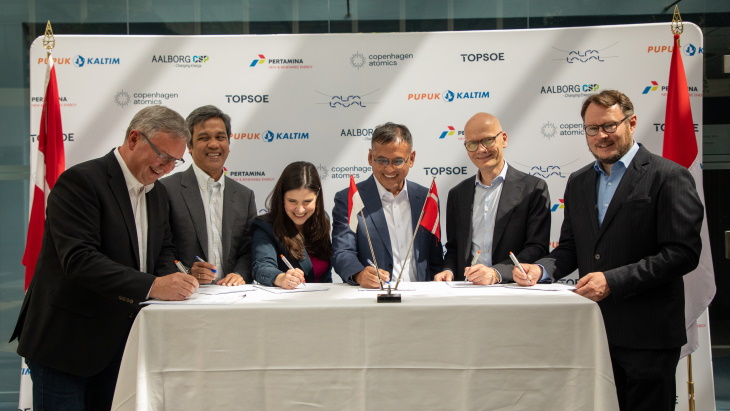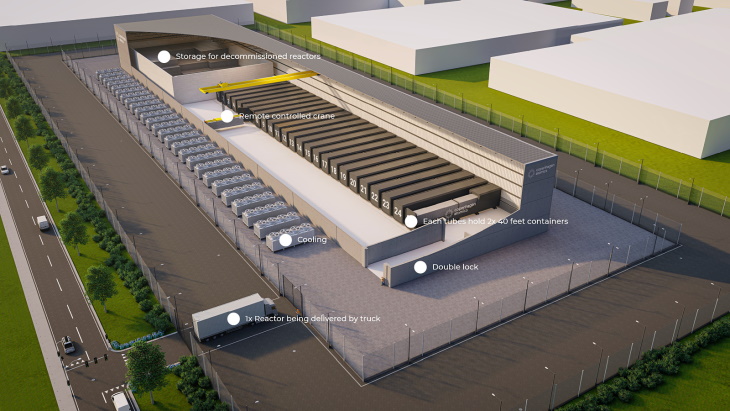A collaboration between Danish and Indonesian companies will study the operational and regulatory conditions for constructing an ammonia production facility in Indonesia powered by Copenhagen Atomics' small and modular thorium molten salt reactors.

The signing of the MoU in Copenhagen (Image: Copenhagen Atomics)
Four Danish companies - Copenhagen Atomics, Aalborg CSP, Alfa Laval and Topsoe - have signed a memorandum of understanding with Indonesian ammonia producer Pupuk Kalimantan Timur (PKT), together with Pertamina New & Renewable Energy to investigate building a facility in the city of Bontang on the eastern coast of the island of Borneo, in the province of East Kalimantan.
The facility - expected to open in 2028 - will produce 1 million tonnes of ultra-low emission ammonia annually, with an estimated investment of USD4 billion. This is sufficient to produce fertiliser for the production of food for 45 million people, about one-sixth of the Indonesian population. During the plant's 50-year lifetime, it will produce ammonia worth USD25 billion at today's prices.
In addition to the ammonia synthesis, Topsoe will supply newly-developed electrolysis cell technology, called Solid Oxide Electrolyser Cell (SOEC). SOEC is claimed to make the production of hydrogen up to 30% more efficient than competing technologies. Hydrogen is an intermediate stage in the production of ammonia. Alfa Laval will deliver heat exchangers to optimise the energy balance of the plant, and desalination to produce ultra-pure water for the electrolysis process. Copenhagen Atomics will supply its thorium molten salt small modular reactors (SMRs). Meanwhile, Aalborg CSP will design and supply thermal energy storage systems, molten salt based steam boilers providing the energy balancing required to integrate the energy production from the SMR modules with electricity production and waste heat from power turbines with production of ultra clean water.
The nuclear power plant part of the project will comprise of 25 SMR modules proving a total of 1 GW.

A visualisation of a 1 GW plant based on Copenhagen Atomics' molten salt reactor (Image: UK Atomics)
"In the next six months, the final examinations must be completed and the legal landscape in Indonesia should be fully mapped," Copenhagen Atomics said.
"The study aims to overcome the challenge of energy intensity in producing green ammonia," PKT said. "The study seeks to ascertain whether the use of thorium-based nuclear technology can enable the production of ammonia without the use of hydrocarbon raw materials while remaining competitive in price."
"Pupuk Kaltim views the joint study as an essential step towards achieving our sustainability goals," said Rahmad Pribadi, President Director of PKT. "We are honoured to work with industry leaders to promote sustainable practices and contribute to a greener planet. Our commitment to sustainability is reflected in our focus on innovation to revolutionise the agricultural sector. As consumers increasingly prefer sustainable and eco-friendly products, PKT is proud to be at the forefront of this movement."
Thomas Jam Pedersen, chairman and co-founder of Copenhagen Atomics. "Green ammonia at low price helps reduce the world's CO2 emissions, and for our thorium reactors, that market is a huge opportunity, especially when we can offer a complete plant together with our partners."